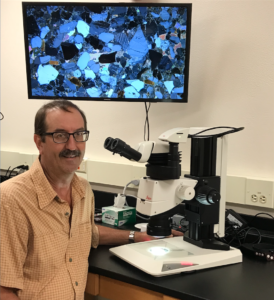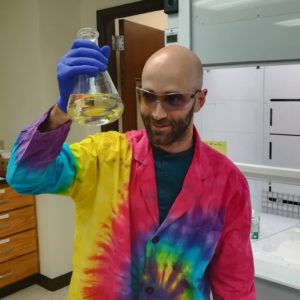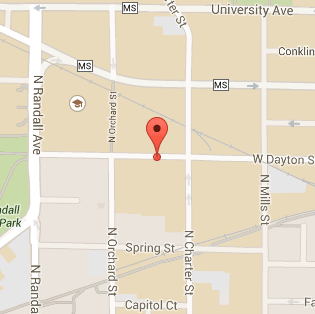Brad Singer
Brad Singer, Professor of Geoscience and Department Chair, is director of the WiscA r laboratory. Brad drives the development of new analytical techniques and geological applications of 40Ar/39Ar dating, and oversees WiscAr staff and students. He creates web-based training materials, and delivers short courses on geochronology. Brad also engages with researchers, students, and lab staff to design and implement projects, and help them understand and report data in peer-reviewed papers.
r laboratory. Brad drives the development of new analytical techniques and geological applications of 40Ar/39Ar dating, and oversees WiscAr staff and students. He creates web-based training materials, and delivers short courses on geochronology. Brad also engages with researchers, students, and lab staff to design and implement projects, and help them understand and report data in peer-reviewed papers.
Brad completed his B.A. in Geological Sciences at the University of California-Santa Barbara, M.S. in Geology at the University of New Mexico, and PhD in Geology at the University of Wyoming. He was a visiting Assistant Professor at the University of Michigan, and an Assistant Professor at the University of Geneva, Switzerland, before joining the faculty at the University of Wisconsin-Madison in 1999. His research uses high-precision geochronology to resolve fundamental problems, mainly in three areas: (1) linking the long-term evolution of volcanoes to current states of activity and unrest, (2) the history of the earth’s magnetic field and geodynamo, and (3) chronostratigraphy and evolution of sedimentary basins. The WiscAr laboratory is sought out by researchers and students outside of the University of Wisconsin-Madison to address volcanic, igneous, tectonic, and sedimentary processes.
Brian Jicha
![[Photo of Dr. Brian Jicha]](https://geochronology.geoscience.wisc.edu/wp-content/uploads/2014/12/bjicha01.jpg) Dr. Brian Jicha, Distinguished Research Scientist, manages the day-to-day operations of the WiscAr laboratory. His duties include data analysis, maintenance of the sample preparation and mass spectrometry laboratories, coordination of irradiation and analytical schedules, and training of students and visiting scholars in all aspects of 40Ar/39Ar geochronology.
Dr. Brian Jicha, Distinguished Research Scientist, manages the day-to-day operations of the WiscAr laboratory. His duties include data analysis, maintenance of the sample preparation and mass spectrometry laboratories, coordination of irradiation and analytical schedules, and training of students and visiting scholars in all aspects of 40Ar/39Ar geochronology.
Brian earned his B.S. in Geology from Cleveland State University, and M.S. and Ph.D. in Geology from the University of Wisconsin-Madison. His main research interests are: (1) Developing analytical protocols for high-precision (better than ±1‰) 40Ar/39Ar geochronology and for low-K material (< 0.2 wt.% K2O) using multi-collector mass spectrometry, (2) Using 40Ar/39Ar dating coupled with detailed geologic mapping, geochemistry, and stratigraphy to understand the long-term eruptive histories and magmatic evolution of active arc volcanoes, and (3) Investigating subduction initiation and rates of magma production in active circum-Pacific island arcs.
Bryan Wathen
 Bryan Wathen joined the WiscAr Lab team as a research specialist in 2017. His primary responsibilities include extracting potassium-rich phases from whole rock samples, preparing samples for irradiation and analysis, sample information logging and tracking, maintaining the mineral separations laboratory, and teaching students the fine art of mineral separations.
Bryan Wathen joined the WiscAr Lab team as a research specialist in 2017. His primary responsibilities include extracting potassium-rich phases from whole rock samples, preparing samples for irradiation and analysis, sample information logging and tracking, maintaining the mineral separations laboratory, and teaching students the fine art of mineral separations.
He received his B.S and M.S in Geology from Indiana University studying mica foliation development and deformation mechanisms in ductile shear zones. His main interests include making little rocks out of big rocks, dissolving rocks in acid, watching rocks and minerals float, floating himself down the lakes and rivers of Wisconsin, and brewing beer.
Peter Sobol
![[Photo of Peter Sobol]](https://geochronology.geoscience.wisc.edu/wp-content/uploads/2014/12/jsobol01.jpg) Peter Sobol is a Senior Instrumentation Technician with the Department of Geoscience. His background includes many years developing, operating and maintaining electron, x-ray and ion spectrometers and related instrumentation. His experience also includes developing methods for automating data acquisition and analysis with software and hardware. In addition to supporting the WiscAr Geochronology laboratory, Peter supports and develops field and laboratory instrumentation for all groups within the Department.
Peter Sobol is a Senior Instrumentation Technician with the Department of Geoscience. His background includes many years developing, operating and maintaining electron, x-ray and ion spectrometers and related instrumentation. His experience also includes developing methods for automating data acquisition and analysis with software and hardware. In addition to supporting the WiscAr Geochronology laboratory, Peter supports and develops field and laboratory instrumentation for all groups within the Department.
![[UW-Madison Crest]](https://geochronology.geoscience.wisc.edu/wp-content/themes/uw-wiscar2015/library/images/uw-crest.png)
![[WiscAr Logo]](https://geochronology.geoscience.wisc.edu/wp-content/themes/uw-wiscar2015/library/images/wiscar-logo.png)
